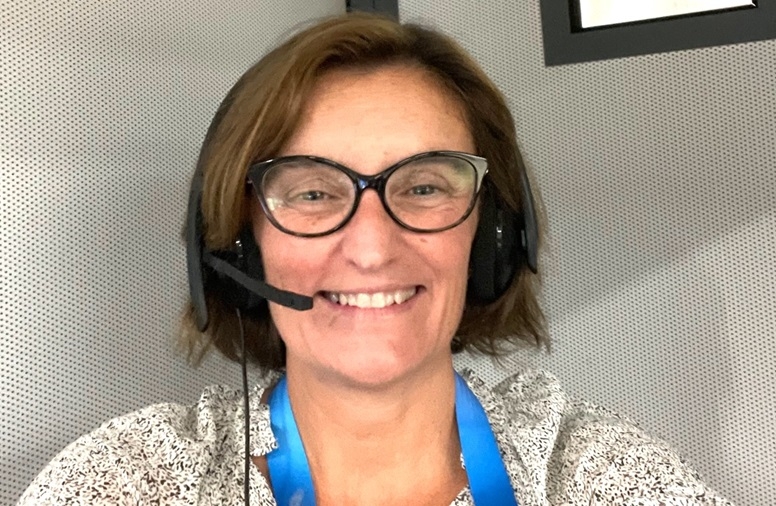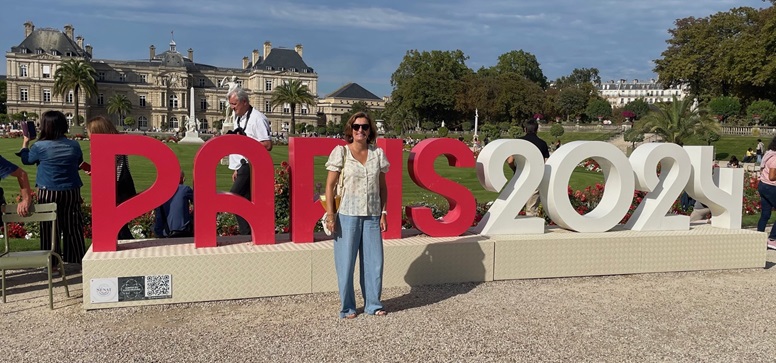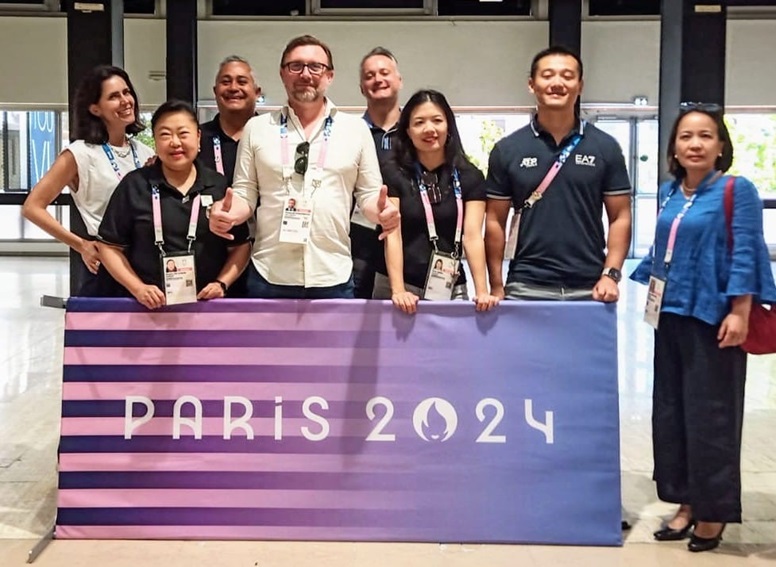How I Got Hired: Translator, United Nations
| by Amy Fruchter CI ’18
Alum Amy Fruchter shares how her experiences at the Middlebury Institute and constructive feedback from her professors helped her become a translator at the United Nations.

For interpreters, there are few international events with the sheer sizzle and scale of the Olympic games.
So it’s no surprise that many of the Institute’s translation and interpretation faculty and alumni have interpreted at the games over the years.
Professor Stephanie Cooper was one of the 64 interpreters selected for the Paris Olympic Games and among a dozen selected for the Paris Paralympic Games.
“I did not even think twice. It’s in my home country and it happens once in a lifetime—literally once in my lifetime,” said Cooper, who graduated from the Middlebury Institute with her MA in Translation and Interpretation in 1999.
Cooper recently shared her experiences interpreting at the games.

It was thrilling to be the voice of the Lebrun brothers and Simon Gauzy when they won the bronze medal in the men’s team table tennis event. They were the pride and joy of France, and I got to represent them. I also had the honor of being the voice for another headline-grabber, Leon Marchand, the phenomenal French swimmer who scooped up multiple gold medals, as well as Manon Apithy-Brunet, a French athlete who took gold in women’s fencing sabre individual.
But it wasn’t just about the big names. I also had the privilege of interpreting for lesser-known athletes, including several amazing women weightlifters from Latin America like Mari Leivis Sánchez from Colombia and Angie Paola Palacios Dajomes from Ecuador.
Being the voice of someone who has poured their entire life into reaching this moment is indescribable. For some, it was their fourth or even sixth attempt before finally achieving success. To witness that and share their joy, their thrill—it’s a moment that cannot be replicated. It’s unique, humbling, and filled with so much happiness.
Being the voice of someone who has poured their entire life into reaching this moment is indescribable.
Something many don’t realize is that interpreters no longer go out in person to all of the events. The 64 interpreters worked out of a centralized hub with about 30 interpretation booths that received video feeds from all the events.
Every day was quite busy, although there were two shifts so interpreters had time to recuperate. It’s also not just sports. The International Olympic Committee is a complex organization and the big, high-stakes meetings can feel like the United Nations. There were daily confidential chefs de mission meetings that we interpreted, as well as a press conference every morning at 11 a.m. That was usually high stakes, where they would make important announcements such as whether the Seine was swimmable! There was interpretation in supported languages for all press conferences involving medalists.
I interpreted for both the Olympics and the Paralympics, working for about four weeks in total.
During the Olympics, I lived like a nun. I didn’t really go out or socialize. You need to be rested and sharp. It’s like an athletic marathon for you in a way, an intellectual athletic marathon.
Every host country has its own process. France opened it up to every interpreter in the world, and you had to compile a big bid dossier. The selection committee considered various factors, including experience in international sports.
I have nurtured the desire to do the Olympics for many years. I first started to build my experience when I was hired as an interpreter for the Confederation of North, Central America and Caribbean Association Football (CONCACAF), a subdivision of FIFA. Then I was brought on as a remote interpreter for the Tokyo Olympics with some less visible assignments where I could learn the ropes with a seasoned interpreter. That all helped me to be more competitive.

For months, I was watching as many sporting events as I could and reading about sports in English, French and Spanish. I also researched the potential winners and got to know their stories because that’s a large part of what’s talked about during the press conferences. I also had to get up to speed on new sports like skateboarding and breakdancing in all three languages.
Then two weeks prior, I stopped preparing and just headed to France to spend time visiting my family so that I could relax, and be just physically and mentally happy. That worked out quite well for me.
It’s not a solo activity—we worked as a team. I had the privilege of working with an incredible group of people. Chief interpreter Alexandre Ponomarev was exceptional—quick, understanding, organized, and always supportive. For example, when I fell sick with a bad fever for two days, he quickly adjusted my schedule to give me time to recover. Before the Games, I shared my preliminary glossary with colleagues, who could use it for their early prep. I also greatly benefited from the feedback and advice of more experienced colleagues. I also very much appreciated it when colleagues would remain ready to help out in the booth—writing a year, a stat, or a name. It does help with the massive cognitive load we have to deal with during high-profile and live interviews!
Further, interpreters could rely on the ongoing support of an amazing technical team. The engineer overseeing the interpretation system, Nathan Navez, made sure we only had to worry about interpretation, and he had to worry about all tech, which was no small endeavor! He worked his magic to fix bugs, small and big! Also, Nathalie Greff-Santamaria, Language Services manager for Paris 2024, was there for us from day one to ensure we could do our work in the best conditions possible.
Not having a chance to interpret for the surfers because the competition was in Tahiti! It was the first time that French Polynesia won gold in the men’s surf, and it was just absolutely insane. Congrats again to Kauli Vaast! That was the one time I stayed up late, so I could watch the final. To whoever might be out there: If you ever want to send me to work for a surf competition, I’ll do it. I’ll come sweep the floor (or wax the boards…)!
Master of Arts in Translation; Translation and Interpretation; Conference Interpretation
| by Amy Fruchter CI ’18
Alum Amy Fruchter shares how her experiences at the Middlebury Institute and constructive feedback from her professors helped her become a translator at the United Nations.
Alum Patricia Berger shares how the translation and editing skills she gained at the Middlebury Institute helped her secure a role as a content manager at Deutsche Bahn.
| by Sara Garví and MACI ‘17
Conference Interpretation graduate Sara Garví shares how her coursework and the interpretation practicum combined with reaching out to alumni in Madrid led to a flourishing freelance career there.